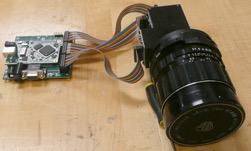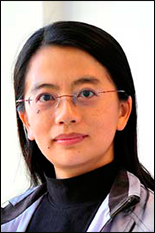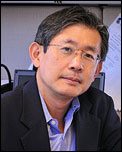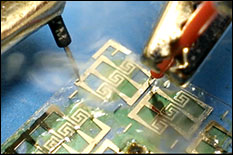News Story
Booz Allen Colloquium Spring Series to Feature Variety of Distinguished Speakers

The University of Maryland's Booz Allen Hamilton Distinguished Colloquium Series in Electrical and Computer Engineering (ECE) will feature eight speakers this spring, speaking on a wide range of subjects, from soft x-ray laser beams to spoken document processing.
The Booz Allen Hamilton Distinguished Colloquium Series in ECE features distinguished speakers from across the nation and around the globe, and also provides venues in which ECE faculty at the University of Maryland can showcase their research to a broad audience of their colleagues and students, as well as friends of the university. The Distinguished Colloquium Series is sponsored by Booz Allen Hamilton.
The following offers a brief overview of each of the eight speakers and their talks:

February 17, 2012
How Our Neurons Code the World: Insights from Signal Processing
Dr. Dmitri Chklovskii, Janelia Farm, Howard Hughes Medical Institute
Jeong H. Kim Engineering Building, Rm. 1110
3:00 p.m.
See Video of Colloquium Talk
Our sensory organs face the challenge of communicating information about the world to the rest of the brain through a limited bandwidth channel. Because natural stimuli are highly correlated they may be compressed using predictive coding, a strategy developed by engineers more than fifty years ago. Indeed, many known neurobiological observations, such as center-surround receptive fields, can be explained in the predictive coding framework. We demonstrate that a negative feedback circuit commonly found in the brain may implement both linear and non-linear predictive coding allowing us to make non-trivial, testable predictions. Therefore, predictive coding may help formulate a much needed unified theory of sensory processing.

February 24, 2012
Generation of Intense Soft X-Ray Laser Beams in Table-top Plasma-based Amplifiers: Probing and Altering the Nano-world
Prof. Jorge Rocca, Colorado State University
Jeong H. Kim Engineering Building, Rm. 1110
3:00 p.m.
See Video of Colloquium Talk
Since their inversion more than 50 years ago, lasers emitting infrared, visible, and ultraviolet light have revolutionized science and greatly impacted the way we live. There is now a great interest in the generation of intense laser beams at soft x-ray wavelengths for nano-scale science and technology applications. This talk will review recent advances in the development of compact lasers that generate extremely bright soft x-ray beams from dense discharge created and laser-created plasmas on a table-top. Recent progress includes the generation of intense laser beams with wavelengths as short as 8.8 nm and the observation of lasing at wavelengths down to 7.3 nm. The generation of fully phase coherent soft x-ray laser pulses of picosecond duration using an injection-seeding technique will be discussed. These new compact lasers are making possible numerous table-top experiments with intense coherent soft x-ray pulses. These include imaging the nano-scale dynamic interactions, probing the composition of materials with nano-scale spatial resolution, patterning and machining nano-scale features, and soft x-ray interferometry for the diagnostics of dense plasmas.

March 9, 2012
Security Using Fuzzy Credentials
Prof. Srini Devadas, Massachusetts Institute of Technology
Jeong H. Kim Engineering Building, Rm. 1110
3:00 p.m.
See Video of Colloquium Talk
Traditional methods for achieving security using cryptography assume fixed, repeatable secrets stored in non-volatile memory in various devices. These secrets may be vulnerable to physical and side-channel attacks. Physical Unclonable Functions (PUFs) are a tamper resistant way of establishing shared secrets with a physical device. They rely on the inevitable manufacturing variations between devices to produce credentials for a device. However, like biometrics, these credentials are fuzzy, i.e., not perfectly repeatable. We describe how PUFs can be used to securely authenticate individual integrated circuits at low cost by tolerating errors in PUF responses. Low-cost authentication enables a variety of anti-counterfeiting applications. PUF responses, in combination with error correction codes, have been used to produce reliable, volatile secrets. We describe a novel, hardware-efficient scheme to generate repeatable secrets corresponding to hidden PUF challenges by using tolerant pattern matching of PUF responses. Finally, we describe how PUFs can be used to build physically- and computationally-secure processors that are capable of a range of cryptographic functionality.

March 30, 2012
Scaling Down Robotics: Mobility, Mechanisms, and Motors for Microrobots
Prof. Sarah Bergbreiter, University of Maryland
Jeong H. Kim Engineering Building, Rm. 1110
3:00 p.m.
See Video of Colloquium Talk
Research on mobile microrobots has been ongoing for the last 20 years, but the few robots that have walked have done so at slow speeds on smooth silicon wafers. However, ants can move at speeds over 40 body lengths/second on surfaces from picnic tables to front lawns. What challenges do we still need to tackle for microrobots to achieve this incredible mobility? This talk will discuss some of the mechanisms and motors we have designed and fabricated to enable robot mobility at the insect size scale. Mechanisms utilize new microfabrication processes to incorporate materials with widely varying moduli and functionality for more complexity in smaller packages. Actuators are designed to provide significant improvements in force density, efficiency and robustness over previous microactuators. Results include a 4mm jumping mechanism that can be launched approximately 35 cm straight up as well as a 300mg robot that jumps 8 cm with on-board power, sensing, actuation and control.

April 13, 2012
Learning and Inference for Graphical and Heirarchical Models
Prof. Alan Willsky, Massachusetts Institute of Technology
Jeong H. Kim Engineering Building, Rm. 1110
3:00 p.m.
See Video of Colloquium Talk
This talk will provide an overview of a personal perspective on inference and learning for graphical models, one that began with work on multi-resolution models for signals and images but that has evolved into a more general look at inference and learning especially for graphical models for which these tasks are tractable and scalable to large problems. The talk will begin with a brief introduction to Markov models on undirected graphs and message-passing algorithms, often known as Belief Propagation, that exactly solve inference problems for s on a very special set of graphs, namely those without loops or cycles, i.e., trees. We’ll then turn to building or learning models on such graphs, including ones that explicitly have hierarchical structure and will comment on some of the differences between the questions that have typically been addressed in very different communities (namely machine learning and system theory). We’ll then provide a new method for learning models on trees with hidden nodes. The rest of the talk will deal with a look at what happens if one considers graphs with loops. We first look at what is known as Loopy Belief Propagation and provide, for the Gaussian case, an explicit picture of what it does and when and why it works and when it doesn’t based on what we call walk-sum analysis. We then use these ideas to describe another new set of algorithms based on the graph-theoretic concept of a feedback vertex set (i.e., a set of nodes in the graph that, if removed, leave a cycle-free graph). As time allows we’ll discuss the learning of several other classes of graphical models, where in each case, the objective is to learn models for which both the learning of these models as well as exact or nearly exact inference using these models is computational feasible.

April 20, 2012
Algorithms for Audio, Speech, and Gestures in Microsoft Kinect
Dr. Alex Acero, Microsoft Research
Jeong H. Kim Engineering Building, Rm. 1110
3:00 p.m.
See Video of Colloquium Talk
In this talk, I will describe some of the technologies developed in Microsoft Research that went into Microsoft Kinect, the fastest selling consumer electronics device, and the challenges we faced. I will describe audio processing techniques such as microphone design, multi-channel echo cancelation, array beam forming, noise reduction, and speech recognition that made possible to do hands-free speech recognition at 3 meters. I will also describe algorithms used for depth sensing, pose estimation, skeletal tracking, and face and gaze tracking that made possible playing games without a controller. I will illustrate with a few scenarios where these technologies are useful, such as Avatar Kinect and voice search, and applications outside of gaming made possible by the Kinect SDK.

April 27, 2012
Why Do You Need to Account for 'TRUST' in Modern Hardware Design?
Mr. Saverio Fazzari, Booz Allen Hamilton
Jeong H. Kim Engineering Building, Rm. 1110
3:00 p.m.
See Video of Colloquium Talk
The incorporation of electronics into modern devices is happening at a frantic pace. Products are faster, more capable, and smaller than ever before. These benefits are not without risks; the process for the development of modern electronics hardware is very expensive, and the number of failures experienced in today’s systems is growing. Designers are expected not only to validate that the electronics they build will perform as expected in the lab, but also to ensure that they will function properly with other elements of an integrated system. Today’s electronic systems can include hardware developed using a wide variety of technologies, with origins both known and unknown. In order to provide the designers with some degree of confidence that their solutions will operate as intended (in their solutions), “TRUST” is needed in the design flow process. This talk will discuss the technical aspects associated with TRUST in electronic design and the impact of the evolving hardware solution.

May 4, 2012
Looking Beyond Words in Spoken Document Processing
Professor Mari Ostendorf, University of Washington
Jeong H. Kim Engineering Building, Rm. 1110
3:00 p.m.
See Video of Colloquium Talk
The talk will present a new approach for colocated multiple-input multiple-output (MIMO) radar using compressive sensing (CS). CS-based MIMO radar exploit the sparsity of targets in the illuminated space to achieve the same localization performance as traditional MIMO radar but with significantly fewer measurements. Each receive node of the MIMO radar compresses the received signal via a linear transformation, referred to as measurement matrix. The compressively obtained samples are subsequently forwarded to a fusion center, where an optimization problem is formulated and solved for target information. The measurement matrix plays an important role in CS recovery algorithms. The talk will also discuss optimal design of the measurement matrix and also reduced complexity suboptimal constructions for it.
Published February 13, 2012








